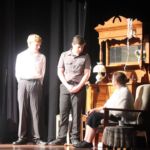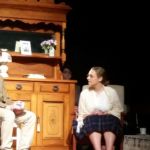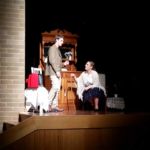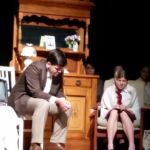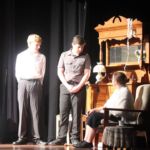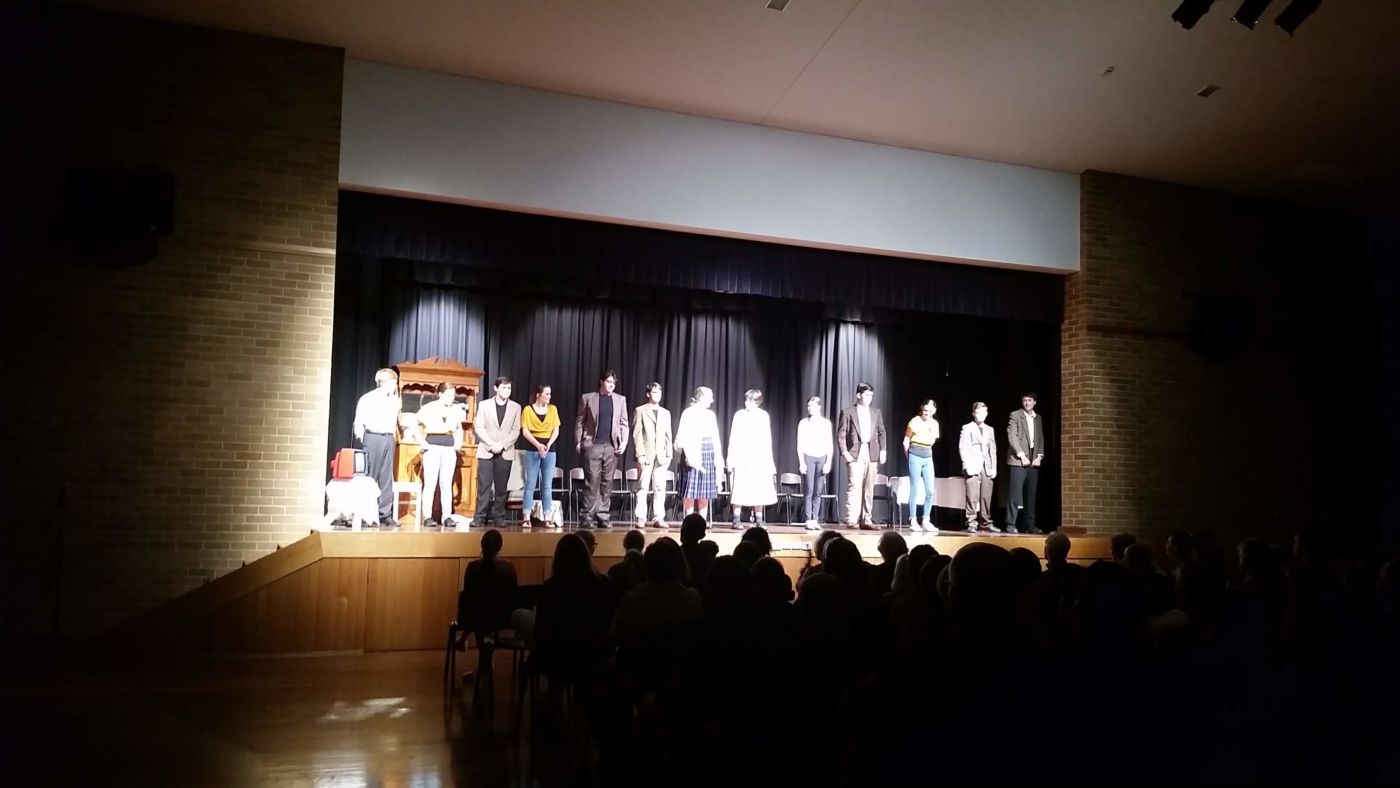 Our Year 9 & 10 Drama students have spent this semester preparing for their performance of Tom Holloway’s Forget Me Not – a moving drama centring on the true experiences of one boy who was sent to Australia from the UK as a child migrant in the early 1950s. The play was dedicated, by the playwright, “to The Child Migrants Trust, and to every single one of the 3000+ former child migrants and their families.” In this play, the character Gerry seeks to represent, in some way, the experiences of every child who came to Australia through the scheme.
Our Year 9 & 10 Drama students have spent this semester preparing for their performance of Tom Holloway’s Forget Me Not – a moving drama centring on the true experiences of one boy who was sent to Australia from the UK as a child migrant in the early 1950s. The play was dedicated, by the playwright, “to The Child Migrants Trust, and to every single one of the 3000+ former child migrants and their families.” In this play, the character Gerry seeks to represent, in some way, the experiences of every child who came to Australia through the scheme.
On the night our students gave a stunning performance of the play which had the audience mesmerised and at times moved to tears as they carefully and thoughtfully portrayed the lifelong impacts this scheme had in the lives of those who were a part of it.
Our Drama Teacher and play Director writes:
This is a play about truth. Not only the truth of our nation’s history, but the truth of what happened for each and every child who was brought here through the Child Migrant Scheme. Who were they? Who sent them? Who missed them? What lies were they told and why? What abuses did they suffer in institutional care in our country? And how did this then go on to shape the rest of their lives and the lives of their families?
Our school vision statement is: Encouraging learning founded on God’s Word: nurturing faith, unwrapping truth, encouraging discernment and enabling thoughtful action. ‘Unwrapping truth’ is a main focus of what we seek to do in our classrooms at Wycliffe. Sometimes the truth isn’t nice. Sometimes it is brutal.
In this performance, you are seeing how Drama can be a powerful way to provide our students with experiences and learning that embodies our school vision statement. These students have experienced the impact of taking on a role, stepping for a time into the shoes of another person, building empathy for that person’s experiences and questioning what motivates them to speak and to act the way they do. By using the Brechtian technique of playing multiple roles, each student is forced to step into the shoes of different characters, performing their story.
They seek to unpack what the motivations are for their character, and then bring a sense of truth to the way that they portray the character on stage. This is deep analysis that trains a student in thoughtful action as they seek to faithfully represent the inner life of their character on stage. These characters do not always think and act in desirable ways, and by understanding their motivations and emotions, we can understand people better, and by inference gain a deeper understanding of our own motivations and actions.
But perhaps more importantly, this play forces us to analyse the actions of the decision makers in our nation’s history. How did we as a nation come to the decision that moving children for their homes was a wise and hopeful thing? This is not the story of a stolen generation of indigenous children, but a further story of the stolen children of the poorer, struggling, working class families of some of the UK’s poorest communities. Perhaps these parents were told stories of hope about what their children might be able to achieve in the new world of Australia. But the sad reality is being carefully uncovered by the work of restoration organisations, seeking to put right the horribly wrong actions of people who have gone before us. By remembering, it is our hope that we will thoughtfully act to ensure that stories like this do not happen again.
Our Students also reflected on how studying, learning and performing the play has impacted them:
I think a play like this is important for the audience to see because it opens their minds to what things actually happen in the world. Something like the child migrant scheme – hardly anyone knew about it. With a play like this being produced, people start to think what else they haven’t been told by the government. With people seeing a small part of the scheme, they may go home and do further research which they can then share. (Dom)
I think that ‘Forget Me Not’ is an extremely important play that has challenged every member of the class. It has been a difficult journey to learn lines although the hardest part has been unlocking the emotion behind the words. I believe this play is a testimony to the emotional, physical and mental abuse suffered by these children; abuse so intense it kept many broken long into adulthood. ‘Forget Me Not’ has been an incredible experience and has helped me empathise and feel anger I’ve never had, pain I’ve never endured and deep loss I would never wish on anyone. (Jordan)
I feel like this is play is important for audiences to see because it is a part of our Australian history. We need to know what happened back then so we can learn from our mistakes and understand the consequences that come from our actions. Even if the consequences happen years later. (Isaac)
I think it is very important that audiences see a play like ‘Forget Me Not’ because it is a very compelling way of understanding the stories and experiences of many young children in situations similar to Gerry’s. I think that during this production, I have been able to access a far deeper understanding of the horrors that children and parents alike went through in the process of separation. I see first-hand the lies and deception of some people, but also the good will of people who want to reunite such people that shines through. (Alex)
This play we have been doing has taught me so much about a part of Australian history that is almost never talked about. I have had the chance to learn more about this part of history and try to portray and connect with the characters who have endured and experience the tribulations of being a child migrant. Not only have I connected with Gerry’s character, I have explored what it would be like to be a child of one of these migrants, Sally. It’s interesting to realise that these people are also very heavily affected by the child migrant scheme, normally being alienated from their parent and having a hard time to connect and relate to them. (Eleanor)
‘Forget Me Not’ has really revealed a part of Australian history that I had been unaware of. We all know about the Stolen Generation, but we never hear about the other, equally horrific time in our history when we de-valued human life and broke families apart. As a Christian, the abuse Gerry endured, the way he was deceived and taken away from his mother, by the church no less, is confronting. How can Christians, who are taught to model Jesus in love and integrity, act in the reverse? We see again how the Church can so easily sway from truth. This challenged me substantially, and made me really think about not being afraid to stand against society or stand up for what I believe, but also remaining firm in Jesus. And we cannot cover up our past; we need to face it, so that it doesn’t happen again. This play has really pushed me, forced me to tap into emotions I might not wish to revisit and get over my fears of what people may think. This play is so complex and tells a messy, real, powerful story. I hope that we can do it justice. (Molly)
